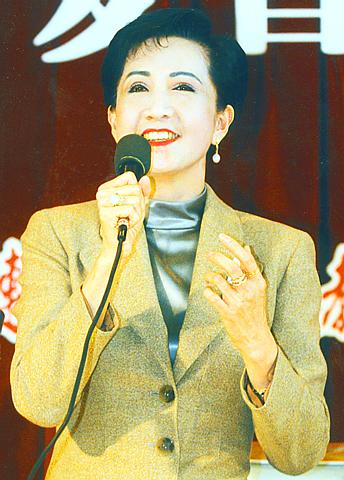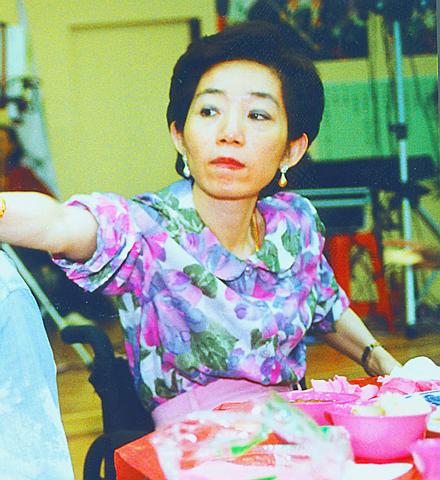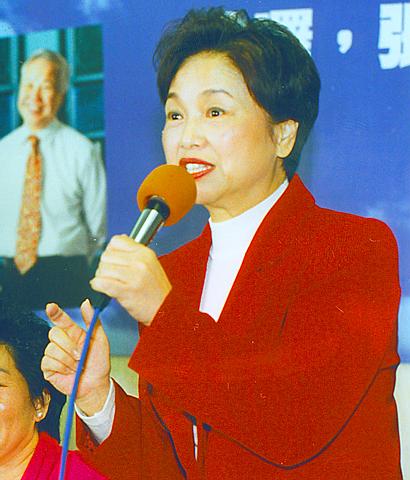A former "Miss ROC" beauty queen, Lien Fang Yu (
In an opinion poll released on Jan. 29 by the SET cable network, 33.3 percent of female respondents described Lien Fang Yu as "the most fitting candidate for first lady," while Chen Wang-shui (
But KMT grass-roots leaders are not convinced of Lien Fang Yu's vote-pulling power.

FILE PHOTO
During a swing through the counties last November aimed at boosting Lien's campaign, KMT secretary-general Huang Kun-hui (
"Both Lien Fang Yu and Liu are `poison' to the KMT's presidential box office," the unidentified KMT local official said.
Lien Fang Yu's problem is that with her "Miss ROC" background and marriage into the family of the wealthy vice president, she appears to have lived in a family-oriented gilded cage of privilege with which people find it difficult to identify.

FILE PHOTO
At the same time she is neither media-savvy nor a good campaign speaker. As a result she has met with a backlash of unpopularity from the public -- much as her husband has during the campaign.
"Unlike Soong's wife, Chen Wang-shui, Lien Fang Yu pays more attention to family and her children than to interaction with the public. So, in terms of exercising campaign language, Lien Fang Yu is not as familiar as Chen," said Chen Shei-saint (
Chen also pointed to a lack of political guile.

FILE PHOTO
"Lien Fang Yu is a decent and innocent person, and she has always said whatever flashes into her mind. No doubt, she has no intentions to hurt anybody, but her words could easily be given new twists by either the opposition or the media."
Her daughter Lien Hui-hsin (連惠心) has similar concerns about her.
"My mother treats everyone as if they are a good guy," she says. "I sometimes worry that she may be deceived [by others]."
In such a scenario, Chen and other campaign counselors have advised Lien Fang Yu to do "less talking, more handshaking.''
Soong's secret weapon
Although these would-be members of the "first wives' club" all claim to dislike engaging in political affairs, both Soong's wife, Chen Wang-shui, and the wife of the DPP's Chen, Wu Shu-jen, find themselves quite welcomed -- at least compared with Lien Fang Yu -- by their husbands to help boost campaign momentum.
Soong once described his wife as his "secret weapon,'' saying he could always rely on her to lend an ear to grass-root opinions.
Chen has said that she has more extensive channels for gathering information at the grassroots than her husband because his political prominence makes it difficult to meet people in natural settings.
Chu Tzong-ko (
"Chen enjoys going to buy things on the street, and in the meantime she can find out what the public is thinking,'' Chu said.
"With Chen's easy-going personality, we believe she could well draw in many votes for Soong's campaign," Chu said.
While Chen has tried her best to boost her husband's presidential bid, she has, however, never concealed her contempt for politics, whether in public or on private occasions.
She has said previously that she would be the "loyal opposition in my family" in order to monitor Soong's performance as an elected official.
"I hate politics. But ironically, I married a man who cares about politics above anything else," Chen said.
"I have no idea how power can corrupt people, but I will do my best to prevent Soong from being corrupted by this power," Chen added.
`The most difficult job on the planet'
The relationship between the DPP's Chen Shui-bian and his own wife, Wu Shu-chen, is probably even more interesting than that of the Soongs.
While the wives of both Soong and Chen say they dislike their husbands' devotion to politics, Wu's opinions on the subject are even more frank.
Wu herself has also played an even more hard-line role than Soong's wife, despite a physical handicap that confines her to a wheelchair.
Wu was paralyzed after being run over in 1985 in what many suspect was a politically-motivated assassination attempt.
"Being a politician's wife is the most difficult job on the planet. I would recommend that all women should never allow their husbands to take part in politics. It's just like a drug abuser -- once he starts, he'll never stop," Wu said on Jan. 31.
"A-bian [Chen's well-known diminutive] always gives me different reasons when he needs to join a campaign and he has already signed piles of guarantees for me. I don't know when he will really come back to me.''
With the presidential election fast approaching, Wu said as each day passes, she feels less pain. No matter whether her husband won or lost, "I will get some benefit," she said.
"If he wins, our labor during all these days will have been worth it; if he loses, I can get my husband back,'' Wu said.
In spite of her scorn for politics, she is still someone willing to give Chen extra impetus to overcome obstacles to his political career.
"Twenty years ago, it was Wu that persuaded Chen to accept the appointment as lawyer for two of the defendants in the Kaohsiung Incident and that marked the beginning of Chen's political pursuits," said Luo Wen-jia (羅文嘉), the DPP's spokesperson and a top aide to Chen.
"Wu is the master of the family, while at the same time, Chen has also relied on her instincts to help him make significant decisions," Luo said.

SECURITY: As China is ‘reshaping’ Hong Kong’s population, Taiwan must raise the eligibility threshold for applications from Hong Kongers, Chiu Chui-cheng said When Hong Kong and Macau citizens apply for residency in Taiwan, it would be under a new category that includes a “national security observation period,” Mainland Affairs Council (MAC) Minister Chiu Chui-cheng (邱垂正) said yesterday. President William Lai (賴清德) on March 13 announced 17 strategies to counter China’s aggression toward Taiwan, including incorporating national security considerations into the review process for residency applications from Hong Kong and Macau citizens. The situation in Hong Kong is constantly changing, Chiu said to media yesterday on the sidelines of the Taipei Technology Run hosted by the Taipei Neihu Technology Park Development Association. With

CARROT AND STICK: While unrelenting in its military threats, China attracted nearly 40,000 Taiwanese to over 400 business events last year Nearly 40,000 Taiwanese last year joined industry events in China, such as conferences and trade fairs, supported by the Chinese government, a study showed yesterday, as Beijing ramps up a charm offensive toward Taipei alongside military pressure. China has long taken a carrot-and-stick approach to Taiwan, threatening it with the prospect of military action while reaching out to those it believes are amenable to Beijing’s point of view. Taiwanese security officials are wary of what they see as Beijing’s influence campaigns to sway public opinion after Taipei and Beijing gradually resumed travel links halted by the COVID-19 pandemic, but the scale of

A US Marine Corps regiment equipped with Naval Strike Missiles (NSM) is set to participate in the upcoming Balikatan 25 exercise in the Luzon Strait, marking the system’s first-ever deployment in the Philippines. US and Philippine officials have separately confirmed that the Navy Marine Expeditionary Ship Interdiction System (NMESIS) — the mobile launch platform for the Naval Strike Missile — would take part in the joint exercise. The missiles are being deployed to “a strategic first island chain chokepoint” in the waters between Taiwan proper and the Philippines, US-based Naval News reported. “The Luzon Strait and Bashi Channel represent a critical access

Pope Francis is be laid to rest on Saturday after lying in state for three days in St Peter’s Basilica, where the faithful are expected to flock to pay their respects to history’s first Latin American pontiff. The cardinals met yesterday in the Vatican’s synod hall to chart the next steps before a conclave begins to choose Francis’ successor, as condolences poured in from around the world. According to current norms, the conclave must begin between May 5 and 10. The cardinals set the funeral for Saturday at 10am in St Peter’s Square, to be celebrated by the dean of the College